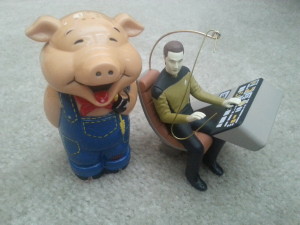Me: Well Data knows a lot about science.
Prodigal: Yeah, I’m no scientist but it can be helpful.
Me: Yes, I think I will show appreciation for all y’all out there who work with science and also love it.
This is from the book Beyond Opinion Living the Faith We Defend by Ravi Zacharias
The story of Galileo’s treatment at the hands of the Roman Catholic Church is often used to fuel the conflict view of science and religion. Historical research shows that this view is flawed. Galileo was no atheist. He believed in Scripture before he faced the Inquisition, and he believed in Scripture afterward. Galileo’s “crime” was that he challenged the then reigning Aristotelian scientific paradigm, that a fixed and unmoving earth was at the center of the universe. This view, be it noted, was held both by the pagan philosophers of Galileo’s day and by the churchmen who felt that it fit with their interpretation of Scripture. They were all in error.
Ironically, it was Galileo, a believer in Scripture, who correctly challenged the then reigning scientific paradigm in the name of science. One important lesson is that those of us who take the biblical account seriously should be humble enough to distinguish between what the Bible says and our interpretations of it. The biblical text just might be more sophisticated then we first imagined, and we might therefore be in danger of using it to support ideas that it never intended to teach.
In recent years, careful research has underminded the conflict thesis. Historian Colin Russell concludes, “The common belief that ….the actual relations between religion and science over the last few centuries have been marked by deep and enduring hostility…is not only historically inaccurate, but actually a caricature so grotesque that what needs to be explained is how it could possibly have achieved any degree of respectability.
What is the exceeding greatness of his power to us who believe, according to the working of his mighty power, which he wrought in Christ, when he raised him from the dead, and set him at his own right hand in the heavenly places.
Ephesians 1:19-20
Jennifer Van Allen
www.theprodigalpig.com
www.faithincounseling.org

















